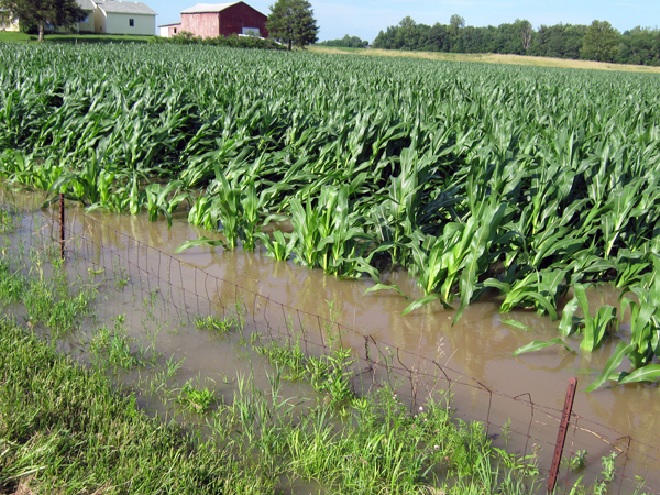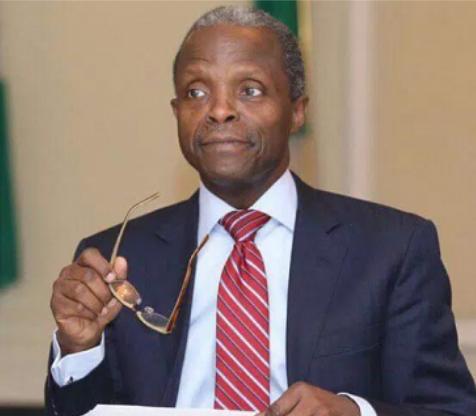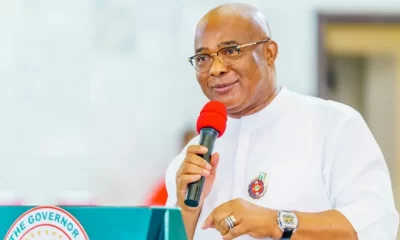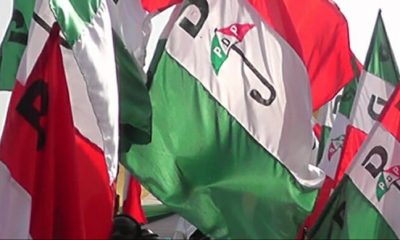Economy
Osinbajo Inaugurates NDPHC 2x60MVA, 132/33KV Awka Substation
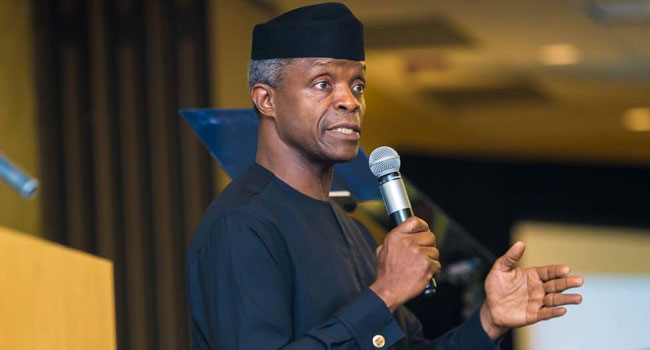
Osinbajo inaugurates NDPHC 2x60MVA, 132/33KV Awka substationInaugurationBy Constance AthekameAbuja, Aug. 25, 2021 (NAN) Vice President, Prof. Yemi Osinbajo, has inaugurated the 2×60 Mega Volt Ampree (MVA) 132/33 Kilo Volt (KV) Awka Substation in Anambra State, built by the Niger Delta Power Holding Company Limited (NDPHC) to improve power supply to the state.
A statement by the NDPHC said that the Vice President, who is also the Chairman of NDPHC Board, inaugurated the project on Tuesday. Speaking at the ceremony, Osinbajo reiterated Federal Government’s commitment to continue to create enabling environment for businesses to grow in the country.Osinbajo noted that for Nigeria’s economy to grow at required rate, small businesses have to be supported by both the Federal and State governments.He said that the new substation, built by the NDPHC, would deliver about 100 Mega Watts (MW) of power to the Anambra state capital and its environs.“The economy of Nigeria largely depends on efforts made at the sub-national level, that’s the state level.“It is the aggregation of the work that is done in the states that leads to the great economy that we hope for and are working for in this nation of ours.“Anambra State revenue has increased from about N10.4 billion in 2014 to N26.37 billion as at 2019 and this is another 152 per cent increase in the state’s Internal Generated Revenue (IGR),” he said.The VP said that enabling environment and ease of doing business implemented in Anambra has seen it becoming one of the fastest growing manufacturing hubs in the country.He said that Nnewi houses key local manufacturing companies, including Innoson Vehicles Manufacturing, Tommy Tommy Industries, Chikason Group, amongst others, is evidence of the entrepreneurial ability of the Nigerian people and the drive is possible but also importantly the enabling environment that states can create.” Osinbajo emphasised that the way the economy will develop is through small businesses powered by states and assisted as much as possible by the Federal Government.He pointed out that the industrial growth of the state happened despite power supply challenge, adding that the new substation is a direct measure by the government to address the challenge.“Since the technical commissioning of the substation in November 2020, this new substation has been in service providing 33KV evacuation capacity for at least 100MW of power through its two units of 60MVA, a total of 120MVA.“The commitment of the administration to ensure the completion of the Awka NIPP 132KVA grid substation now provides a hitherto unavailable 70MW additional power capacity for driving industrial growth and boosting the economy of the state, with a positive effect on employment and social-economic upliftment for residents of the state,” he said.Also speaking, the Anambra state Governor, Willie Obiano, thanked the Federal Government and the NDPHC for constructing the substation, saying it will greatly boost the industrialization of the state.Obiano noted that with improved power supply to the state, many industries would save the cost of self generation of electricity.He said that the newly-commissioned shoe making factory and the cargo airport would be direct beneficiaries of the new substation.Earlier in his address, the Managing Director of NDPHC, Mr. Chiedu Ugbo, disclosed that besides the industries, about a million households in Awka and its environs will benefit from improved power supply.Ugbo said that the project is one of the several transmission projects conceived under the National Integrated Power Project (NIPP) being implemented by NDPHC.He said that the project is part of Federal Government’s commitment towards improving electricity transmission infrastructure in the country.He explained that “the substation is provided with six 33kV feeders to enable a robust power evacuation to the following hitherto constrained locations of the EEDC Franchise territory of Anambra, including two premium new locations critical to the Anambra Government, the Awka Township 33/11kV Injection Substation; the Agu Awka 2unit 15MVA 33/11kV Injection Substation serving the nearby Agu Awka Industrial Layout; the Enugu-Ukwu 33/11kV Injection Substation; the Aguleri/Umuleri 33/11kV Injection Substation; the New Anambra Airport; and the New Awka Millennium City.”He also said that the company has recently completed a 32 Kilometers (KM) of line with one unit of 2.5MVA and injection substation to the new airport in the state.“The feeder from this Awka transmission substation will be supplying close to one million households spread over the urban and rural parts of the state, including existing and upcoming industrial layouts, factories, markets and other critical state infrastructures,” he added.On her part, the Managing Director of News Engineering, the contractor who handled the project, Mrs Josephine Nwaeze, disclosed that the project was executed solely by Nigerians.She called on the Federal Government to make more projects available to indigenous companies to grow the economy. (NAN)Economy
Organise Informal Sector, Tax Prosperity Not Poverty, Adedeji Tasks Officials

The Chairman, Joint Tax Board (JTB), Dr Zacch Adedeji, has urged officials of the board to organise traders and artisans into a formal body before capturing them in the tax net.
Adedeji said that this was in line with the agenda of President Bola Tinubu not to tax poverty but prosperity.
The chairman stated this at the 157th Joint Tax Board meeting held in Ibadan, on Monday.
The theme of the meeting “Taxation of the Informal Sector: Potentials and Challenges”.
Speaking on the theme of the event, Adedeji stressed the need to evolve a system that would make the informal sector formal before it could be taxed.
Adedeji, who also doubles as the Chairman, Federal Inland Revenue Service, (FIRS), said “What I would not expect from the JTB meeting is to define a system that would tax the informal sector.
“The only thing is to formalize the informal sector, not to design a system on how to collect tax from market men and women.
“As revenue administrator, our goal is to organise the informal sector so that it can fit into existing tax law.”
Citing a report of the National Bureau of Statistics (NBS) in the first quarter of 2023, the chairman said that the nation’s unemployment index was attributable to recognised informal work.
Adedeji stated that workers in that sector accounted for 92.6 per cent of the employed population in the country as at Q1 2023.
“JTB IS transiting to the Joint Revenue Board with expanded scope and functions.
“We are hopeful that by the time we hold the next meeting of the Board, the Joint Revenue Board (Establishment) Bill would have been signed into Law by the President.
“The meetings of the board provide the platform for members to engage and brainstorm on contemporary and emerging issues on tax, and taxation,” he said.
In his address, Gov. Seyi Makinde of Oyo State, said the theme of the meeting was apt and timely, stressing that it coincides with the agenda of the state to improve on its internally generated revenue.
According to him, the meeting should find the best way forward in addressing the issue of the informal sector and balance the identified challenges.
“Nigeria is rich in natural resources, but it is a poor country because economic prosperity does not base on natural resources,”
Makinde also said that knowledge, skill and intensive production were required for economic prosperity, not just the availability of natural resources.
He stressed the need to move from expecting Federal Allocations to generating income internally.
“We are actively ensuring that people are productive and moving the revenue base forward,” Makinde said.
The governor said that tax drive should be done by simplifying tax processes, incentives for compliance like access to empowerment schemes and loans.
He urged JTB to deepen partnership and innovation in using data on tax to track and administer it.
Earlier, the Executive Chairman, Oyo State Board of Internal Revenue, Mr Olufemi Awakan, said the meeting was to address tax-related matters, evolve a workable, effective and
efficient tax system across the states and at the Federal level.
He urged participants to find amicable solutions to challenges of tax jurisdiction, among others.
Tax administrators from all the 36 states of the federation, who are members of JTB, were in attendance. (NAN)
Economy
Customs Zone D Seizes Contraband Worth N110m

The Nigeria Customs Service (NCS), Federal Operation Unit (FOU), Zone D, has seized smuggled goods worth over N110 million between April 20 till date.
The Comptroller of Customs, Abubakar Umar, said this at a news conference on Tuesday in Bauchi.
He listed the seized items to include 11,200 litres of petrol; 192 bales of second hand clothing, 140 cartons of pasta, 125 pairs of jungle boots, 47 bags of foreign parboiled rice and 9.
40 kilogramme of pangolin scales.Umar said the items were seized through increased patrols, intelligence-led operations, and strengthened inter-agency collaboration.
The comptroller said the pangolin scales would be handed over to the National Environmental Standards and Regulations Enforcement Agency (NESREA) for appropriate action, while the seized petrol would be auctioned, and the proceeds remitted to the federation account.
He attributed the decrease in smuggling activities of wildlife, narcotics, and fuel to the dedication and professionalism displayed by the personnel in line with Sections 226 and 245 of the NCS Act 2023.
The comptroller enjoined traders to remain law abiding, adding the service would scale up sensitisation activities to combat smuggling.
“We remain resolute in securing the borders and contributing to Nigeria’s economic development,” he said.
The FOU Zone D comprises Adamawa; Taraba, Bauchi, Gombe, Borno, Yobe, Plateau, Benue and Nasarawa. (NAN)
Economy
Trade Tensions: Global Economy Stands at Fragile Turning Point -UN
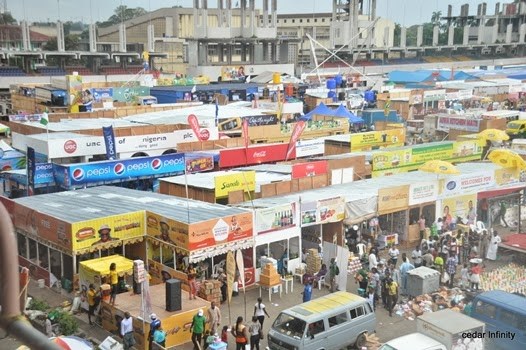
The UN Department of Economic and Social Affairs (UN DESA) has said that the global economy stands at a fragile turning point amid escalating trade tensions and growing policy uncertainties.UN DESA, in a report published on Thursday, stated that tariff-driven price pressures were adding to inflation risks, leaving trade-dependent economies particularly vulnerable.
It stated that higher tariffs and shifting trade policies were threatening to disrupt global supply chains, raise production costs, and delay key investment decisions – all of this weakening the prospects for global growth. The economic slowdown is widespread, affecting both developed and developing economies around the world, according to the report.For instance, in the United States, growth is projected to slow “significantly”, as higher tariffs and policy uncertainty are expected to weigh on private investment and consumer spending.Several major developing economies, including Brazil and Mexico, are also experiencing downward revisions in their growth forecasts.China’s economy is expected to grow by 4.6 per cent this year, down from 5.0 per cent in 2024. This slowdown reflects a weakening in consumer confidence, disruptions in export-driven manufacturing, and ongoing challenges in the Chinese property sector.By early 2025, inflation had exceeded pre-pandemic averages in two-thirds of countries worldwide, with more than 20 developing economies experiencing double-digit inflation rates.This comes despite global headline inflation easing between 2023 and 2024.Food inflation remained especially high in Africa, and in South and Western Asia, averaging above six per cent. This continues to hit low-income households hardest.Rising trade barriers and climate-related shocks are further driving up inflation, highlighting the urgent need for coordinated policies to stabilise prices and protect the most vulnerable populations.“The tariff shock risks hitting vulnerable developing countries hard,” Li Junhua, UN Under-Secretary-General for Economic and Social Affairs, said in a statement.As central banks try to balance the need to control inflation with efforts to support weakening economies, many governments – particularly in developing countries – have limited fiscal space. This makes it more difficult for them to respond effectively to the economic slowdown.For many developing countries, this challenging economic outlook threatens efforts to create jobs, reduce poverty, and tackle inequality, the report underlines. (NAN)


